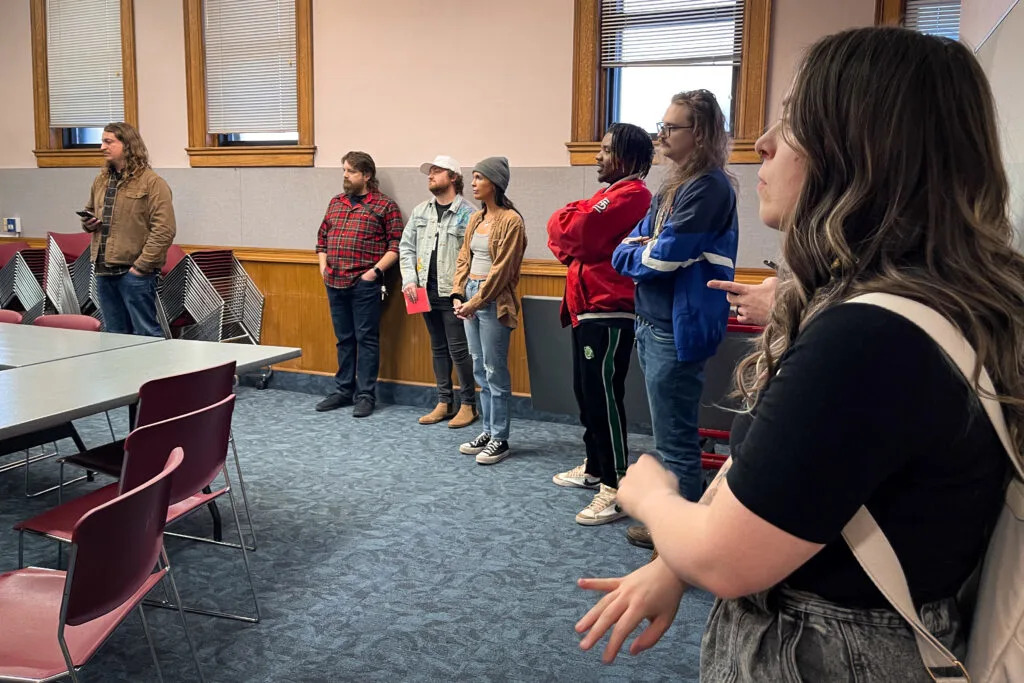Post-harvest employees at BeLeaf Medical’s Sinse facility await union election results on Feb. 6 at the St. Louis Public Library Barr branch (Rebecca Rivas/Missouri Independent).
It’s been more than seven months since employees of St. Louis-based Beleaf Medical cannabis company held an election to unionize.
The majority of the ballots — 11 of the 16 — have remained closed.
“It’s been quite a while,” said Will Braddum, a post-harvest technician at the company’s Sinse facility in St. Louis. “We’re just like, what is happening? Why is this happening? We’re just kind of in the dark waiting.”
The reason behind the delay is likely that Braddum and his fellow “post-harvest” team members exist in a gray area in national labor law — which could change if their union drive is successful.
Not long after Braddum and other employees filed their union petition last September, the company argued before the National Labor Relations Board that the employees aren’t manufacturer workers — they’re agricultural workers.
And agricultural workers don’t have the right to unionize under the country’s labor laws.
But Braddum and his fellow employees — along with the regional director of the NLRB — believe they’re more like workers at tobacco processing plants, who courts repeatedly have found aren’t agricultural workers.
“I’ve never touched a living plant at work,” Braddum said, who is organizing with the United Food and Commercial Workers International Union Local 655.
The company has taken this fight all the way up to the national five-member board, asking them to set a national precedent on whether employees who process the dried marijuana plants have the right to unionize.
And that’s likely why it’s taken so long for the regional director of the NLRB – who twice sided with the employees — to open the ballots, said St. Louis labor attorney George Suggs.
“If this is a unique situation, there’s no reason for [the regional director] to get out front by opening those ballots,” Suggs said. “Ultimately, the board will resolve it.”
But that doesn’t mean the fight would be over, Suggs said.
If the national board sides with the employees, then the company will likely refuse to bargain in order to land the decision in a federal court.
“Employers have this ability to string out the results of a campaign,” especially among businesses where there’s lots of employee turnover, Suggs said.
By the time there’s a resolution a couple years down the road, he said, union support has eroded.
“That’s the tactic,” Suggs said. “That’s what employers have been doing over the 40-plus years that I’ve been practicing labor law.”
A long fight ahead

Over the seven months of waiting, employees have noticed changes in their job descriptions that likely improve the company’s position in the case.
“It just seems like they’re trying to push our jobs more and more in the direction of quote unquote farmers,” said Ahmad “Jxggy” Haynes, a post-harvest technician at BeLeaf Medical’s Sinse facility.
He said the company has hired temp workers to do the manufacturing work, including packaging, that he and other the union members were doing before.
The company began hiring temps right after the employees filed a petition to form a union in September 2023, according to a recording of a recent staff meeting led by a company human resources representative and obtained by The Independent .
At the meeting, the HR representative said Beleaf has “burned through” 150 temporary employees since October. He told the temps they shouldn’t expect to be hired on full time anytime soon, but they should still feel part of the team.
Twice so far this year, NLRB Regional Director Andrea Wilkes – who oversees a swath of six states in the Midwest — has ruled that post-harvest employees’ work is similar to that of employees in a tobacco processing plant.
“Removing the veins from tobacco leaves and fermenting the leaves has been held to be outside the definition of agriculture,” under federal labor law, Wilkes wrote in her Jan. 25 ruling.
The company’s response to her decision indicates that union employees likely have a long fight ahead of them.
According to a Feb. 13 letter from Beleaf’s attorney to Wilkes, the company plans on fighting their employees’ unionization efforts all the way to federal court.
“Although we understand and respect the Board’s recent decision on this issue, we are preserving this issue for presentation to the United States Court of Appeals for the 8th Circuit,” the letter states.
The company can get into court by refusing to bargain with the union, creating “a technical violation,” Suggs said.
That will lead to filing a petition for review in a federal court, Suggs said, so they can challenge the underlying issue in this case — whether these are agricultural workers — “in front of a bunch of federal judges.”
“That’s become a bigger problem, particularly in the Eighth Circuit,” Suggs said, “because you’ve got a number of very conservative judges who are kind of hostile to the labor movement generally.”
Sean Shannon, lead organizer with UFCW Local 655, said it’s obvious this has been the company’s plan all along.
“They clearly stated their intention to bring this as far as the 8th Circuit Court – which is several steps into the fight – in their original statement,” Shannon said of the company’s February letter. “I feel nothing but clear intent to obstruct this union at all costs, which ironically proves just how much these folks need a union.”
H/T: www.yahoo.com



